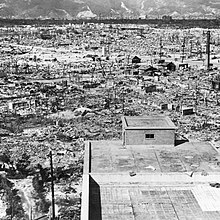
The United States Holocaust Memorial Museum (USHMM) is the United States' official memorial to the Holocaust. Adjacent to the National Mall in Washington, D.C., the USHMM provides for the documentation, study, and interpretation of Holocaust history. It is dedicated to helping leaders and citizens of the world confront hatred, prevent genocide, promote human dignity, and strengthen democracy.

Andreas Maislinger is an Austrian historian and political scientist and founder and chairman of the Austrian Service Abroad, including the Gedenkdienst, the Austrian Social Service and the Austrian Peace Service. He also is the founder of the Austrian Holocaust Memorial Award, the Braunau Contemporary History Days and the inventor of the idea of the House of Responsibility regarding the birthplace of Adolf Hitler.
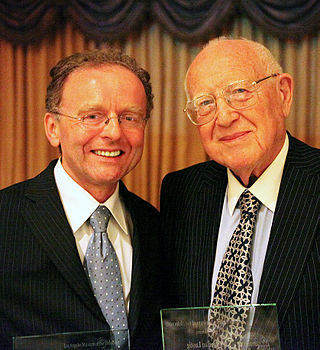
Gedenkdienst is the concept of facing and taking responsibility for the darkest chapters of one's own country's history while ideally being financially supported by one's own country's government to do so. Founded in Austria in 1992 by Andreas Maislinger the Gedenkdienst is an alternative to Austria's compulsory national military service as well as a volunteering platform for Austrians to work in Holocaust- and Jewish culture-related institutions around the world with governmental financial support. In Austria it is also referred to as Austrian Holocaust Memorial Service provided by the Austrian Service Abroad. The Austrian Gedenkdienst serves the remembrance of the crimes of Nazism, commemorates its victims and supports Jewish cultural future. The program is rooted in the acknoledgment of responsibility by the Austrian government for the crimes committed by National Socialism.

The Austrian Service Abroad is a non-profit organization founded by Andreas Hörtnagl, Andreas Maislinger and Michael Prochazka in 1998, which sends young Austrians to work in partner institutions worldwide serving Holocaust commemoration in form of the Gedenkdienst, supporting vulnerable social groups and sustainability initiatives in form of the Austrian Social Service and realizing projects of peace within the framework of the Austrian Peace Service. Its services aim at the permanence of life on earth. The Austrian Service Abroad carries and promotes the idea of the House of Responsibility for the birthplace of Adolf Hitler in Braunau am Inn. The Austrian Service Abroad is the issuer of the annually conferred Austrian Holocaust Memorial Award. The program is funded by the Austrian government.
The Austrian Social Service is part of the Austrian Service Abroad founded by Dr. Andreas Maislinger in 1998. It offers the possibility to substitute the compulsory military service in Austria with a 10-months service abroad and provides a platform for volunteering services.
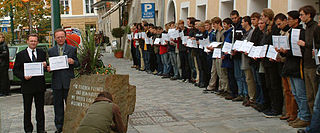
The House of Responsibility (HRB) in Braunau am Inn is the idea of establishing an international meeting place and a place of learning in the birth house of Adolf Hitler. People from all countries, backgrounds, religions and cultures should meet in order to discuss, learn and develop projects revolving around the concept of responsibility relating to the dimensions of past, present and future. The main demography shall be young people. The idea for a House of Responsibility originates from the founder of the Gedenkdienst and chairman of the Austrian Service Abroad Dr. Andreas Maislinger.
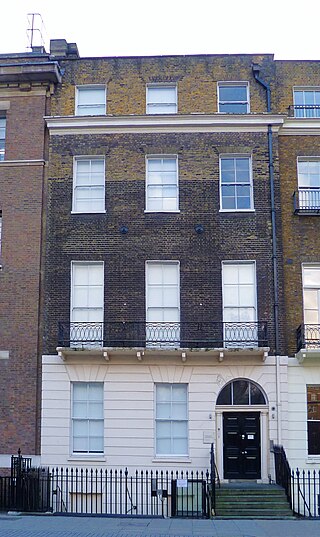
The Wiener Holocaust Library is the world's oldest institution devoted to the study of the Holocaust, its causes and legacies. Founded in 1933 as an information bureau that informed Jewish communities and governments worldwide about the persecution of the Jews under the Nazis, it was transformed into a research institute and public access library after the end of World War II and is situated in Russell Square, London.

Dark tourism has been defined as tourism involving travel to places historically associated with death and tragedy. More recently, it was suggested that the concept should also include reasons tourists visit that site, since the site's attributes alone may not make a visitor a "dark tourist". The main attraction to dark locations is their historical value rather than their associations with death and suffering. Holocaust tourism contains aspects of both dark tourism and heritage tourism.

Dr. James E. Waller is a widely recognized scholar in the field of Holocaust and genocide studies, and the inaugural Cohen Professor of Holocaust and Genocide Studies at Keene State College located in Keene, New Hampshire.

A peace museum is a museum that documents historical peace initiatives. Many peace museums also provide advocacy programs for nonviolent conflict resolution. This may include conflicts at the personal, regional or international level.

The Austrian Holocaust Memorial Award (AHMA) was founded by the Austrian Service Abroad in 2006.
Stephen D. Smith MBE is a Holocaust and genocide specialist who has designed, operated and consulted for many different Holocaust memorial centres. He currently holds the UNESCO Chair on Genocide Education.
Michael Prochazka is an Austrian social scientist and economist and vice-chairman of the Austrian Service Abroad.

The Melbourne Holocaust Museum (MHM) was founded in Elsternwick, Melbourne, Australia, in 1984 by Holocaust survivors. It is currently Australia’s largest institution dedicated to Holocaust education, research & remembrance. Its mission is to commemorate the six million Jews murdered by the Nazis between 1933 and 1945.
Holocaust studies, or sometimes Holocaust research, is a scholarly discipline that encompasses the historical research and study of the Holocaust. Institutions dedicated to Holocaust research investigate the multidisciplinary and interdisciplinary aspects of Holocaust methodology, demography, sociology, and psychology. It also covers the study of Nazi Germany, World War II, Jewish history, religion, Christian-Jewish relations, Holocaust theology, ethics, social responsibility, and genocide on a global scale. Exploring trauma, memories, and testimonies of the experiences of Holocaust survivors, human rights, international relations, Jewish life, Judaism, and Jewish identity in the post-Holocaust world are also covered in this type of research.
The Russian Research and Educational Holocaust Center was founded in 1992 in Moscow and has since then been working on awareness raising of the Holocaust in the Russian society. It is the only non-governmental organization in the Russian Federation, devoted to the study of the life of Soviet Jews during the Great Patriotic War.

USC Shoah Foundation – The Institute for Visual History and Education, formerly Survivors of the Shoah Visual History Foundation, is a nonprofit organization dedicated to making audio-visual interviews with survivors and witnesses of the Holocaust and other genocides, a compelling voice for education and action. It was established by Steven Spielberg in 1994, one year after completing his Academy Award-winning film Schindler's List. In January 2006, the foundation partnered with and relocated to the University of Southern California (USC) and was renamed the USC Shoah Foundation – The Institute for Visual History and Education. In March 2019, the institute opened their new global headquarters on USC's campus.
The Vienna Wiesenthal Institute for Holocaust Studies (VWI) is a research centre dedicated to the research and documentation of and education on all aspects of antisemitism, racism and the Holocaust, including its emergence and aftermath. It was designed by Simon Wiesenthal as well as international and Austrian researchers. The institute is located in Vienna, Austria. It is financed by the City of Vienna and the Austrian Federal Ministry of Education, Science and Research.
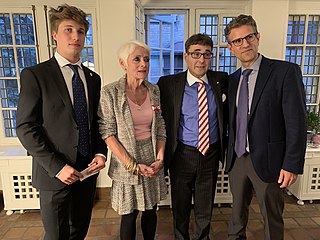
Naomi Kramer is a Canadian curator and president of the Holocaust Education and Genocide Prevention Foundation.
Alexander Martin Korb is a German historian specialising in the Holocaust, Genocide, anti-Semitism and related mass crimes in Central and Eastern Europe. Since 2010 Korb has been Lecturer in Modern European History at the University of Leicester. From 2012 until 2018 he was director of the Stanley Burton Centre for Holocaust Studies.
